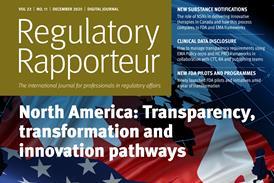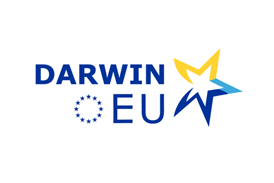All Artificial intelligence (AI) articles
-
 Journal
Journal2025 Regulatory Intelligence Conference Europe: Meeting report
This article summarises sessions from the TOPRA/RAPS 2025 Regulatory Intelligence Conference Europe.
-
 Journal
JournalIVD8: The hunt for evidence – An IVD perspective
This is a report of the IVD8 session that took place at this year’s Symposium.
-
 Journal
JournalIVD6: The evolution of the In Vitro Diagnostic Regulation
This is a report of the IVD6 session that took place at this year’s Symposium.
-
 Journal
JournalMD7: Updates on Artificial Intelligence legislation and policy
This is a report of the MD7 session that took place at this year’s Symposium.
-
 Journal
JournalMD5: The evolution of the EU Medical Device Regulation
This is a report of the MD5 session that took place at this year’s Symposium.
-
 Journal
JournalHM3: Applying Artificial Intelligence in real life
This is a report of the HM3 session that took place at this year’s Symposium.
-
 Contents
ContentsNovember 2025 – Contents: Medical devices/IVD sessions
The November issue of Regulatory Rapporteur reports on the medical devices/IVD sessions from the TOPRA Symposium 2025.
-
 Contents
ContentsNovember 2025 – Contents: Human medicines sessions
The November issue of Regulatory Rapporteur reports on the human medicines sessions from the TOPRA Symposium 2025.
-
 Contents
ContentsRegulatory Rapporteur November 2025 – Contents
The November issue of Regulatory Rapporteur reports on sessions from the TOPRA Symposium 2025.
-
 Journal
JournalHM6: How Artificial Intelligence is transforming regulatory approaches towards chemistry, manufacturing and controls (CMC)
This is a report of the HM6 session that took place at this year’s Symposium.
-
 Industry news
Industry newsNICE reviews health technology assessment to better support patients
This industry news update shares NICE’s plans to review how health technologies are evaluated.
-
 Industry news
Industry newsAI Airlock: Growing the future of artificial intelligence technology in healthcare
This industry news update is about the ongoing projects as a part of AI Airlock led by the MHRA.
-
 Journal
JournalDigital transformation of global regulatory affairs: Then, now and next
This article explores GenAI and Health Level 7’s (HL7) next generation standard for Fast Healthcare Interoperability Resources (FHIR).
-
 Industry news
Industry newsEMA publishes workplan on how to harness data and AI for public health
This industry news update discusses the EMA’s workplan on how to use data and AI to improve public health.
-
 Journal
JournalSandbox of trust: Regulated AI for health promotion and disease prevention
This article explores the capacity and potential for AI tools in analysing health data and helping with disease prevention.
-
 Contents
ContentsJune 2025 – Contents
The June issue of Regulatory Rapporteur focuses on veterinary medicines.
-
 Editorial
EditorialVeterinary medicines: Translating regulation into practice
This issue looks at the impact of the Veterinary Regulation 2019/6, the effect of the new EMA fees on marketing authorisation holders, and the regulatory challenges associated with the practical use of bacteriophages in veterinary medicine.
-
 Journal
JournalAI adoption readiness: Current status and trends in regulatory organisations
There is no doubt that artificial intelligence (AI) and other advanced technologies (AT) will add significant value to global regulatory practices over time. However, it is still unclear how and when integration to a trusted level with attractive business benefits will be achieved for most organisations.
-
 Journal
JournalArtificial intelligence and post-market surveillance
Artificial intelligence (AI) is a force that is both feared and revered for promising revolutionary improvements in many fields. While tools like ChatGPT may create an impression of AI being easy to use, such wide AI applications are prone to hallucinations, or misleading information, and therefore can be dangerous in the context of post-market surveillance (PMS). The more accurate narrow AI tools for PMS do not yet exist, but hold a lot of promise for the future. The solution for effective PMS by AI will require restructuring data into appropriate formats for machine learning (ML).
-




















